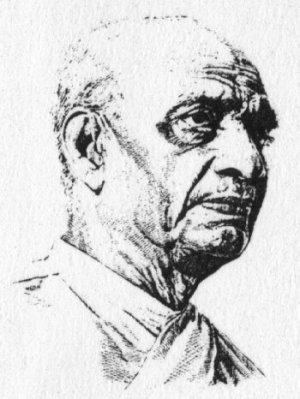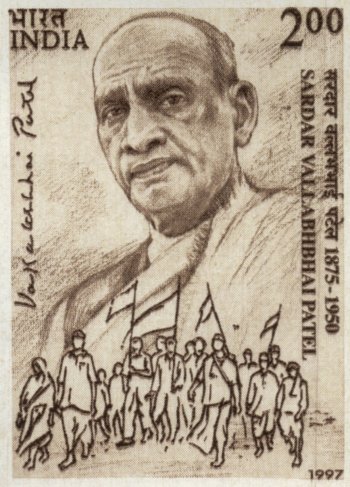Vallabhbhai Patel
V.N. O'key/Kamat's Potpourri
Vallabhbhai Patel (1875-1950)
Portrait in India ink by V.N. O'key
A constructive engineer in politics, a recognized umpire in disputes and an organizer of victories in campaigns, Sardar Vallabhbhai Pate is all this but something more. For the peasants of Gujarat, he was a man of their dreams, the lovable, unconventional being, the champion of lost causes.
Patel's driving force is felt behind Gujarat's myriad movements. He has labored unceasingly to unite tem in the service of the Motherland. By his counsel and example, he has fused their flaming spirits into a blazing torch. He has made Bardoli the rolling stone which sets into motion an avalanche of nationalistic ideas. It is the grandest political laboratory where Sardarji does not rest in merely diagnosing the disease but at once sheds to effect a remedy.
His phenomenal success is an unsolved riddle. The spell of his blunt personality is an object lesson for mass hypnotists.
He is the rate type, the born leader. When his contemporaries are forgotten he will be remembered .The reason is not far to seek. Gandhiji believes in the dawn of spiritual Swaraj. For Sardarji, this is mere moonshine. It does not mean that his spiritual arteries are hardened. He wants to build on the bed-rock of spiritualism the super structure of Swaraj. Hence his political Guru had mistaken edifice for the structure. Posterity will judge who is more practical of the two.
Vallabhbhai was not born to be purple. As a child he was brought up in his surroundings unlikely to awaken his political longings. He spent his days watching weeds and wild flowers. As a protest against the insolence of his teacher he thrice organized strikes.
His father was a farmer by calling. But for a lucky coincidence Patel would have wielded the pick-axe and not the pen. The starting of a high school at Kaira enabled him to further his studies. Thereafter he practiced at Godhra as a Pleader, being eminently successful. His legal acumen and the capacity to work till the small hours of dawn helped him to climb to the highest rung of the professional ladder.
Patel went to England for higher legal studies He was called to the bar at the middle temple, and the Chief Justice Scott predicted that he would become a barrister of renown. After his return, Patel started practice at Ahemdabad. His earnings steadily rose.
When Patel found that his profession was out of harmony with his desire, he gave it up. Then he united all scattered forces in Gujarat for political freedom, social reform and economic change. Very soon he became the right-hand man of Gandhiji. He toured round India and collected Rs ten lakh for the Gujarat Vidyapith.
The Kaira Satyagraha, the Nagpur Agitation and the Bardoli Campaign, which are of great moment in Patel's career, are the landmark in India's struggle for Swaraj. In 1918 owning to a widespread failure of crops, the peasants in Kaira District pleaded for a suspension of assessment. All petitioning and prayer failed. So they embarked on Satyagraha. The response was prompt and splendid. Vallabhbhai suspended his growing practice and cast in his lot with the Satyagrahis.
The peasants shed all fear of officials and stood rock-like in defiance. Patel toured round the villages inculcating the principle of non-violence and steeled the hearts of peasants. The campaign came to an end when the authorities granted suspension to the poor. The Satyagraha laid the foundation of an awakening among the peasants.
The Borsad Satyagraha took place in 1922 for the depravations of an arch-dacoit named Devar Baba, the Government levied a heavy punitive tax on the Taluka. Meanwhile the police entered into a secret pact with a Muslim dacoit, and pitted him against Devar Baba. The shots taken out of the bodies of persons injured in the dacoities proved that the police rifles were being used by the bandits. Vallabhbhai Patel publicly charged the authorities and proved the allegations by photographs. Thereupon the Government withdrew the police on the spot.
The Nagpur Flag Satyagraha was a historic struggle on 1st May 1923,the Magistrate mulgated section 144 prohibiting processions carrying the National Flag. Prominent leaders like Jamnalal Bajaj were arrested. The Satyagraha soon developed into an All India movement. Then Vallabhbhai took charge of the campaign .The flag procession was allowed to pass and it terminated in a victory to the Congress.
K.L. Kamat/Kamat's Potpourri
Sardar Vallabhbhai Patel.
The flood relief work was imperishable monument to the spirit of humanity. The then finance minister ungrudgingly complimented Sardarji on his memorable services. In1929 he was elected as the Chairman of the Municipality. His personal control of the municipal machine enabled him to clear slums and to make the city attractive.
Till 1930,Sardarji was not imprisoned. Some who were impatient of his arrest asked him as to how he bore a charmed life. Sardarji replied: "What shall I do if the Government is not willing to have me as its guest?"
The Karachi Congress met under the gloom cast by the news of the executions of Bhagat Singh, Raj Guru and Sukhdev. The ghosts of the departed patriots were casting ominous shadows over the Assembly. It was difficult to predict whether the resolution relating to Bhagat Singh or the one relating to the ratification of Gandhi-Irwin Agreement was more important. The pendal shook with the uproars of angry young men. In such a moment of crisis the President remained ice cold and clear-sighted. Vallabhbhai's youthful heroism shines better in a crisis than in a calm.
When Gandhiji asked on bended knees for bread, the Government gave him a stone instead. So he regarded it at his sacred duty to break the unjust salt law. While he was yet making preparations, Vallabhbhai went in advance to prepare the villagers for the coming struggle. The Government saw in Vallabhbhai, John the Baptist, who was the forerunner of Jesus. So they laid their hands on him and sentenced him to three months imprisonment. The news of his arrest set Gujarat on flame. Then 75,000 peasants thronged on the sands of Sabarmati and swore:-
"We, the citizens of Ahmedabad, determined hereby shall go the same path were Vallabhbhai has gone, and we shall attain full independence. While attempting to do so within our achieving freedom for the country, we shall not rest in peace. We solemnly declare that India's emancipation lies in the truth and non-violence".
After his release Patel began organizing work in Gujarat. He was appointed acting President of the Congress When all the Congress organizations were declared illegal, the lion of Gujarat roared that every home should therefore be a Congress organization.
He successfully organized the no tax campaign in Gujarat. The oppression of the authorities assumed threatening proportions. The persecuted peasantry migrated into the villages in the Baroda state. Vallabhbhai's own mother aged over 80 was cooking her food and the ruthless police knocked down the boiling pot. With wonderful heroism they bore the untold suffering and strictly adhered to the cult of non-violence .The terrorism of the police constitutes the darkest pages in Indian History. The policemen fixed their bayonets over the heaps of deserted villages. The villagers were haunted every night by a gang of dacoits who fired guns, tore veils and murdered innocents. Vallabhbhai was arrested thrice in eleven months.
In person he is of medium stature, his head set well on his shoulders, his face weathered by stern purpose and illuminated by steady steel blue eyes and his powerful frame suggests strength and decision. In his stout heart a flame burns like an altar fire, the holy flame of the desire for disinterested service. His imaginative and moral qualities -pity, sympathy and understanding give a silver lining to his soul.
K.L. Kamat/Kamat's Potpourri
Sardar Vallabhbhai Patel
Patel is credited with unifying India subsequent to her freedom from British
Patel According to Gandhi
Gandhiji said: "It was a great privilege for me to have been with Sardar Vallabhbhai. I was well aware of his bravery and his burning love for the country, but I never lived with him as I have had the good fortune during the six months. The affection with which he covered me recalls to me that of my own dear mother. I never knew him to possess motherly qualities. If the slightest thing happened to me he would be out of his bed. He superintended every single little detail in connection with my comforts. He and my other associates had conspired me to do nothing, and I hope that the Government will believe me when I say he always showed a remarkable comprehension of the difficulties of the Government whenever we discussed any political problem. His solicitude for the farmers of Bardoli and Kaira I can never forget."
With these touching words Gandhiji invited the Government to take him back to Yeravda to join his companion.
Patel is a simple hermit at heart, full of the life of simple pleasures. He forgets the storms of life by smoking a cigarette, concealing his head in a quiet corner. This is his only luxury, which he sparingly uses.
He is loyal to the cause and country. The change in the political kaleidoscope has not shaken his loyalty o his early idea or early colleagues. He was the President of the Congress Parliamentary Board. He conducted the Baroli Satyagraha .The task was very onerous but he accomplished it with rare tact and ability.
He is strong alike in his friendship and hatred. He remembered his foes with rancor and his friends with gratitude. He galls his enemies with taunts and lashes them with his invective. To enter into a controversy with him is to court disaster, as recent events have proved.
He has an eye for the able man. He has marshaled a picked band of workers to assist him He never makes swans of geese. He loves victory but organization better. He is a rhetorician. He keeps the weapon of oratory sharp and polished and uses it not for display but for propaganda. The language is free from artifice and frills but direct and penetrating. He has a capacity for prophetic wrath against wrong.
His success in politics is not merely that of a courageous adventurer but that of a shrewd and high-principled man.
![]()
Sources: Congress Party Literatures, adapted by Vikas Kamat

